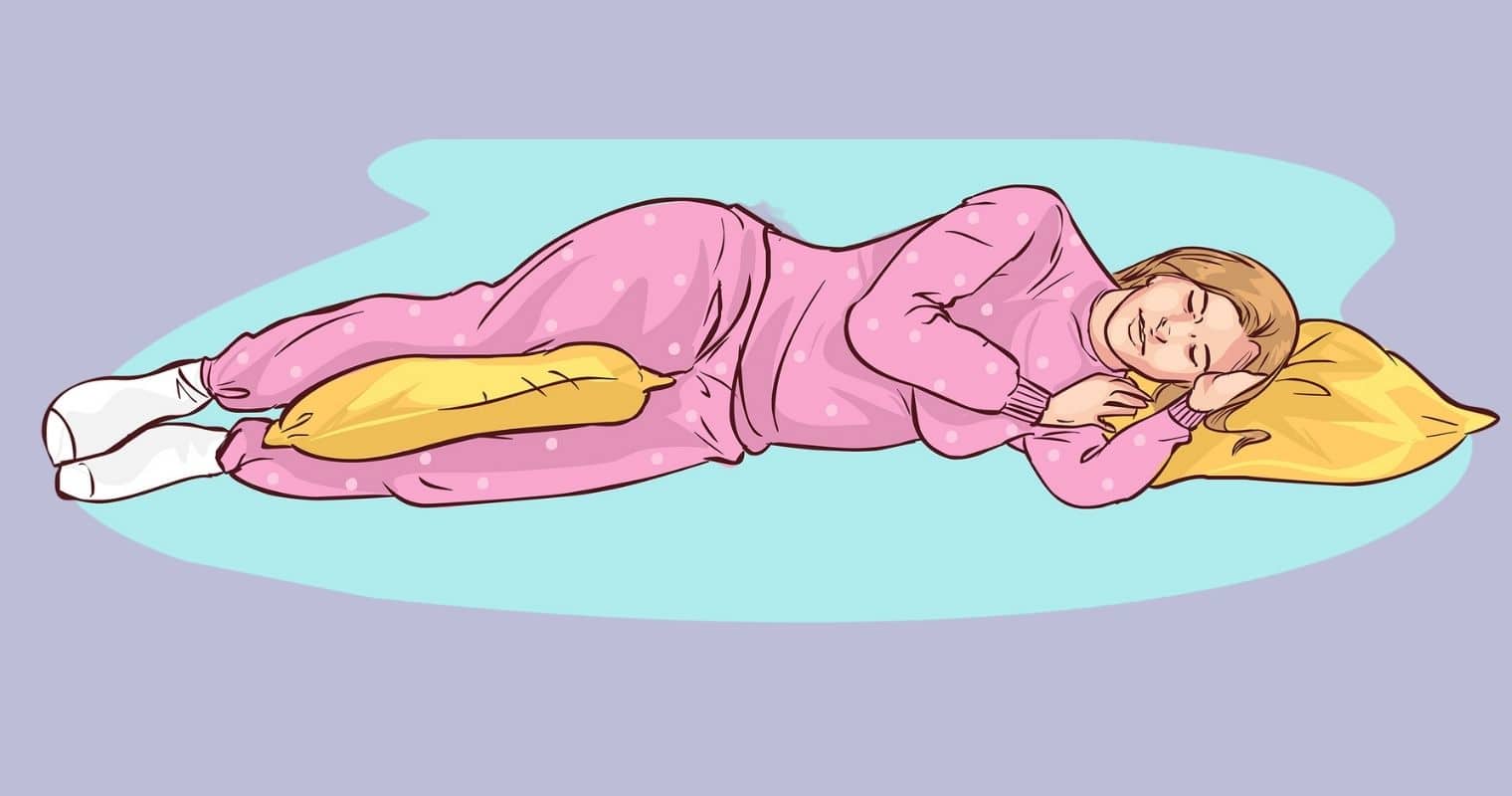Why You Should Sleep On Your Left Side Every Night
We all sleep, but have you ever considered the best way to do it? And here’s the thing—how you sleep can have a big impact on your health! You might be surprised to learn that the position you sleep in actually matters. In fact, sleeping on your left side comes with many benefits, such as better digestion and improved heart health, that could help improve your overall well-being. Continue reading to see why giving your left side a try might be the best thing you can do for yourself.

Sleeping on Your Left Side Promotes Better Digestion
Did you know that sleeping on your left side could be a game-changer for your digestion? The position of your stomach and intestines plays a big role in how your body processes food. The stomach naturally sits on the left side of your body, which means when you lie on your left side, gravity helps food move more easily through your digestive tract. This can lead to less bloating, fewer acid reflux issues, and overall more comfortable digestion. Mayo Clinic says that sleeping on your left side can help prevent acid reflux. This position uses gravity to keep stomach acid in place, making it less likely to move up into your esophagus and cause heartburn.
Sleeping on Your Left Side Can Reduce Heartburn
For those who suffer from heartburn, sleeping on the left side might just be the relief you’ve been looking for. Health experts advise that when you sleep on your right side, the position tends to relax the lower esophageal sphincter—the muscle that keeps stomach acid in its place—which can lead to more acid creeping up and causing discomfort. But when you lie on your left side, this muscle stays above the level of stomach acid, which may help reduce the chances of nighttime heartburn. If you’ve ever experienced that uncomfortable burning feeling while trying to get some rest, this might be a reason to flip over to your left side tonight!
Sleeping on Your Left Side Helps Your Heart

Your heart also benefits from sleeping on your left side. Dr. Brynna Connor, a family doctor, told the National Council on Aging that sleeping on your left side is good for people with high blood pressure. It puts less strain on blood vessels and helps the heart work easier.’ When you sleep on your left, your heart can pump blood more efficiently, largely because of the way gravity helps your circulatory system. By keeping your heart slightly above other organs, this position may help reduce the workload on the heart and improve circulation throughout your body. This is particularly important for people with conditions like high blood pressure, as it can help keep things flowing smoothly.
Sleeping on Your Left Side May Reduce Snoring
Ever wake up to complaints about your snoring? If so, you’re not alone. Snoring is often the result of obstructed airflow during sleep. Research shows that sleeping on your back allows your tongue and soft tissues to collapse toward the back of your throat, which can partially block your airway. But when you sleep on your left side, these tissues are less likely to block your throat, which can make breathing easier and reduce snoring. A study published in 2011 found that left-side sleeping could help people with sleep apnea—a condition that causes interrupted breathing during sleep—have fewer episodes and enjoy more restful sleep.
Sleeping on Your Left Side Supports the Lymphatic System
Your body has a natural drainage system, known as the lymphatic system, that helps remove waste and toxins. Many scientific studies have proven that sleeping on your left side may allow this system to work more efficiently. Since the majority of the lymphatic system is located on the left side of the body, gravity can help move lymph fluid through the nodes and into the bloodstream more effectively when you lie on your left side. This helps your body cleanse itself while you sleep, potentially leaving you feeling more refreshed in the morning.
Sleeping on Your Left Side Can Improve Brain Health
Here’s something you might not know: how you sleep can even affect your brain! Research shows that sleeping on your side—especially your left side—could help your brain clear out toxins that build up during the day. This waste removal process, called the glymphatic system, is most effective when you’re lying on your side. Scientists think that better waste removal could be linked to a lower risk of neurological diseases like Alzheimer’s. Simply put, getting a good night’s rest on your left side might be giving your brain a boost!
Sleeping on Your Left Side Can Be Especially Beneficial During Pregnancy

Pregnant women are often told to sleep on their left side, and there’s a good reason for that. Experts at the American Pregnancy Association note that sleeping on your left side during pregnancy helps improve blood flow to the placenta, ensuring that your baby gets plenty of nutrients and oxygen. This position also helps to keep pressure off the liver, which is located on the right side of your body. Plus, it can help reduce swelling in the legs by improving circulation. So, if you’re expecting, turning to your left might just help you—and your baby—get a better night’s sleep.
Sleeping on Your Left Side Eases Back and Neck Pain
If you struggle with back or neck pain, sleeping on your left side might be just what you need for relief. This position helps maintain spinal alignment, reducing strain on the lower back and neck. When you lie on your left side, it helps keep your spine aligned and reduces the pressure on your lower back. Using a supportive pillow between your knees can further enhance this effect, making sure your hips stay in a neutral position and your spine remains in a healthy alignment. This position can help alleviate discomfort, particularly for those who wake up with a sore back or neck.
Sleeping on Your Left Side is Optimal for Those with Varicose Veins
People with varicose veins often experience discomfort in their legs, especially at night. Sleeping on your left side can help ease this discomfort. By sleeping on the left, you help reduce pressure on the largest vein in the body—the inferior vena cava—which is located on the right side. This helps improve circulation in the legs by using gravity to assist blood flow, reducing the swelling and discomfort associated with varicose veins. For anyone dealing with varicose veins, left-side sleeping can be a simple yet effective way to improve comfort and support better blood flow.
Varicose veins develop when veins become enlarged and overfilled with blood, often due to weakened valves or poor circulation, which makes left-side sleeping beneficial as it can alleviate pressure and promote better circulation.
Tips to Make Sleeping on Your Left Side More Comfortable
Changing your sleep position can feel a little awkward at first, especially if you’re used to sleeping in a different way. Here are some tips to make it easier:
- Use a body pillow: Hugging a pillow can help support your spine and keep you from rolling onto your back during the night.
- Keep your knees bent: Bending your knees and placing a pillow between them can help reduce strain on your hips and lower back.
- Use a supportive pillow for your head: A good pillow can be helpful. Make sure your head is elevated just enough to keep your neck in a neutral position.
- Make your bed comfortable: A comfortable mattress is key. If your mattress is too firm, adding a mattress topper can help you stay cozy on your side.
Are There Any Downsides to Sleeping on Your Left Side?
While sleeping on your left side has numerous health benefits, it might not be ideal for everyone. For example, if you have certain heart conditions, it’s a good idea to check with your physician to see if sleeping on your left side is right for you. Additionally, some people with shoulder or hip pain might find that lying on one side all night can be uncomfortable. In these cases, it’s essential to use proper pillows to relieve pressure and find a position that works best for you.
The Takeaway
Sleeping on your left side might seem like a small change, but it could have a significant impact on your health. From better digestion and reduced heartburn to improved heart function, reduced back pain, and enhanced brain health, the benefits of left-side sleeping are well worth considering. Plus, it’s an easy, natural way to support your body as it rests and repairs overnight. If you’re struggling with issues like heartburn, snoring, poor circulation, or back pain, give left-side sleeping a try—you might just find that it makes all the difference in how you feel each day.
So tonight, when you settle into bed, remember to roll onto your left side. Your body—and your mind—might thank you in the morning!






